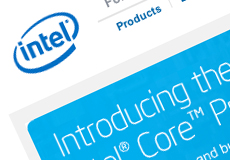Intel Creates Ultrasmall Quark Chips for Wearable Computing
September 13, 2013
Chip manufacturer Intel is debuting very small processors that have a wide variety of uses from wearable devices to medical and industrial applications. Some have criticized the company for not entering the smartphone market fast enough, but with Quark, Intel plans to pursue embedded computing technologies emerging in wearable devices and the Internet of Things. Intel will have to address the expected low price of these chips, along with increased competition from other chip makers.
 “Intel Corp.’s new leaders have vowed to take the company into new markets, and Tuesday they are revealing a key vehicle: a line of ultrasmall chips called Quark that can be used in wearable devices, skin patches or even swallowed to gather medical data,” reports The Wall Street Journal.
“Intel Corp.’s new leaders have vowed to take the company into new markets, and Tuesday they are revealing a key vehicle: a line of ultrasmall chips called Quark that can be used in wearable devices, skin patches or even swallowed to gather medical data,” reports The Wall Street Journal.
“It’s the smallest thing we’ve ever built,” said Renee James, Intel’s president.
Quark is Intel’s most recent effort related to the Internet of Things, an effort to bring computing and communications capability to all things, from light switches to transportation control systems. This field is at times regarded as “embedded” computing, although James prefers the label “integrated” computing.
One problem of this technology is that such applications often involve chips that might cost less than one dollar. Intel is known for its processors for personal computers and servers that often sell for hundreds to thousands of dollars each.
James is not revealing Quark’s pricing, but she said it is one-fifth the size and one-tenth the power consumption of the low-end Atom chip models. The least expensive model is $42.
The company is planning significant profits on Quark chips due to advances in its production processes, which can reduce the size and cost on chips. In 2011, Intel was first to reduce its circuit dimensions to 22 nanometers, and now 14-nanometer chips are due to devices next year.
Intel faces strong competition from other chip and devices manufacturers. Advanced Micro Devices, a longtime rival in PC chips, announced plans for new hardware this week, and Qualcomm says it has developed similar technology — for example, wearable devices including a smartwatch called Toq — and may make medical related hardware.

No Comments Yet
You can be the first to comment!
Leave a comment
You must be logged in to post a comment.